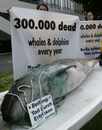Japan Fights Whale Conservation Measure |
 Minoru Morimoto, leader of the Japanese delegation at the IWC. (AFP/DDP/Robert Michael) |
By GEIR MOULSON, Associated Press Writer
BERLIN, 16 June, 2003 [AP] - The International Whaling Commission opened its annual meeting Monday under the threat of a Japanese walkout if the group adopts a hotly contested measure designed to improve whale protection.
The latest clash between pro-whaling nations and those pushing for more conservation involves a 31-page proposal to form a committee charged with "strengthening the conservation agenda" within the 50-nation whaling commission.
The 19 sponsors of the "Berlin Initiative" include the United States, Britain and Australia. The measure calls for working with global wildlife groups to better protect the marine mammals.
"I would be happy if a signal went out from here," said Renate Kuenast, consumer affairs and agriculture minister for Germany, the host of the four-day meeting.
Japan, a leading whaling nation, says the proposal focuses too much on conservation at the expense of sustainable harvests. The meeting began with an argument between the commission's pro- and anti-whaling factions over whether it should be dropped from the agenda altogether.
"We consider this proposed item inappropriate and unfortunate," argued Odd Gunnar Skagestad, the leader of Norway's delegation. "We fear that this proposal will turn out to be yet another divisive issue which the commission could well do without."
 The Japanese delegation (L-R) Kiyoshi Ejima, Yasukazu Hamada and Yoshimasa Hayashi at the IWC meeting.(AFP/DPP/Johannes Eisele) |
Takanori Nagatomo, a whaling official with Japan's fisheries ministry, said that "a walkout is possible if it passes." Objections from Japan, Norway and Iceland were backed by a number of Caribbean and African nations, but rejected by the United States, other European nations and South Africa.
"What we want is to strengthen the conservation agenda, no more," said German delegation leader Peter Bradhering. "It's not directed against anyone."
Animal protection groups say the measure would be the most decisive action by the commission to preserve whales since it imposed a global ban on commercial whaling in 1986.
Since the 19th century, commercial whaling has killed millions of the animals. The commission banned most whaling in the 1980s. Norway ignores the ban, while Japan takes nearly 700 whales a year under a controversial IWC research exemption. Some native cultures are allowed to conduct limited hunts. Many species are near extinction.
A new study released before the IWC meeting suggests that accidental captures may be the biggest immediate threat to whales' survival Ñ even more than ship collisions and pollution.
 A dead Harbour Porpoise lies on a stretcher during a protest in Berlin. Japan says conservation issues are irrelevant.(Michael Dalder/Reuters) |
More than 300,000 whales, dolphins and porpoises are believed to die unintentionally every year in fishermen's hauls, according to the study by American and Scottish biologists published by the World Wildlife Fund.
Japan plans to also ask the IWC in Berlin for a special quota on minke whales to be hunted in the country's coastal waters. Iceland is set to ask the commission for permission to kill whales in the name of scientific research, which critics charge is merely an effort around the ban.
Japanese kill hundreds of whales annually under an IWC exemption for limited "research" hunts. The government says the hunts help gauge the impact of whale herds on fisheries stocks and provide data on their migration patterns and population trends.
Critics call the program commercial whaling in disguise because the meat from the slaughtered whales is sold to wholesalers and ends up in Japanese restaurants, where it is considered a delicacy.